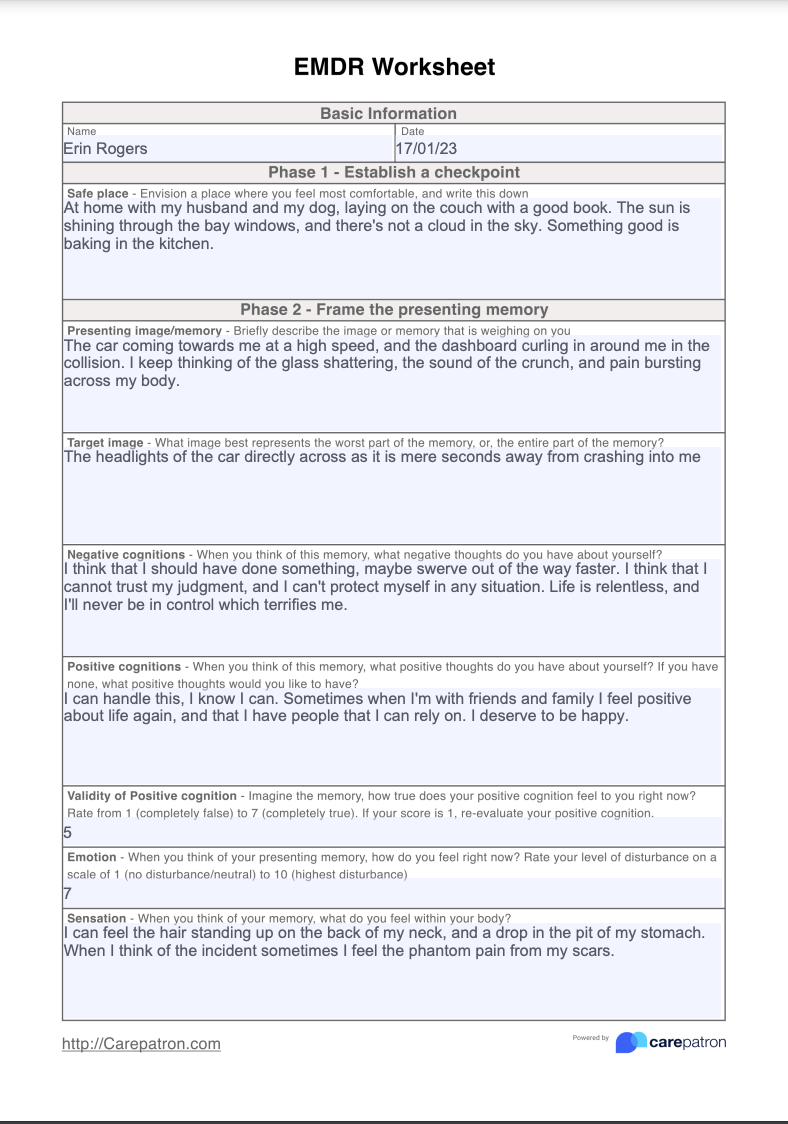EMDR Preparation: Your Essential Worksheet Guide

EMDR (Eye Movement Desensitization and Reprocessing) is a form of psychotherapy that has gained significant popularity for its effectiveness in treating trauma, phobias, anxiety, and other psychological conditions. It involves an eight-phase treatment approach, and one of the pivotal steps is preparation. Adequate preparation not only sets the stage for successful EMDR therapy but also helps clients navigate the therapeutic process with greater ease. This guide will walk you through creating an essential worksheet to aid in your EMDR preparation, ensuring you or your clients are fully equipped for the journey ahead.
The Importance of Preparation in EMDR

EMDR therapy can be an intense emotional journey. Proper preparation:
- Reduces the likelihood of re-traumatization: By assessing the client’s readiness and establishing coping mechanisms.
- Builds trust: Between the therapist and client, which is crucial for the therapeutic alliance.
- Clarifies the process: Ensuring the client understands what to expect, reducing anxiety.
Creating Your EMDR Preparation Worksheet

Here’s how to develop a comprehensive worksheet that encompasses all necessary aspects of EMDR preparation:
Client Background Information

Begin your worksheet with basic client information:
- Name
- Age
- Contact information
- Reason for seeking EMDR therapy
- Relevant psychological history
Explaining EMDR and Informed Consent

Include a section detailing:
- What is EMDR?
- How does EMDR work?
- What to expect during and after sessions?
- Informed consent form
Assessing Emotional Stability

Evaluate the client’s current emotional state with a section for:
- Current stress levels
- Existing coping mechanisms
- Any recent or ongoing stressors or crises
Establishing Safety Measures

Develop safety protocols:
- Emergency contacts
- Signs of dissociation or emotional distress during sessions
- Strategies to manage emotional responses outside of therapy
Resource Development

Include resources that clients can use for self-soothing or grounding:
| Resource | Description |
|---|---|
| Mindfulness | Techniques like meditation or focused breathing to help ground clients |
| Safe Space Imagery | Visualization of a safe, calming place to retreat to during therapy |

Goal Setting

Outline therapeutic goals:
- Short-term objectives for each session
- Long-term goals for overall treatment
Session Planning

Provide a roadmap for the EMDR sessions:
- Expected session duration
- Frequency of sessions
- Possible outcomes and progress markers
Post-Session Activities

Detail what should be done after each session:
- Self-care strategies
- Journaling prompts
- Resource review
💡 Note: Remember that this worksheet should be tailored to each individual client, reflecting their unique circumstances and needs. Personalization is key to ensuring the preparation phase is as effective as possible.
The journey through EMDR therapy requires careful planning and preparation. By utilizing a detailed preparation worksheet, therapists can ensure clients are emotionally, mentally, and physically ready to face and work through their trauma. This worksheet not only helps in setting clear expectations but also in establishing a strong therapeutic foundation, which is essential for navigating the subsequent phases of EMDR therapy successfully. Remember, the process should always be client-centered, promoting safety, understanding, and trust.
What are the phases of EMDR therapy?

+
EMDR therapy involves eight phases: history taking, preparation, assessment, desensitization, installation, body scan, closure, and reevaluation.
How long does the preparation phase take?

+
The length of the preparation phase can vary depending on the client’s readiness, but typically, it can take several sessions to establish trust and coping mechanisms.
Can EMDR be done without professional guidance?
+
EMDR should always be conducted under the supervision of a trained therapist. DIY attempts can lead to re-traumatization and are not recommended.